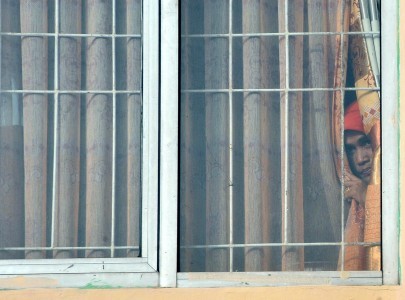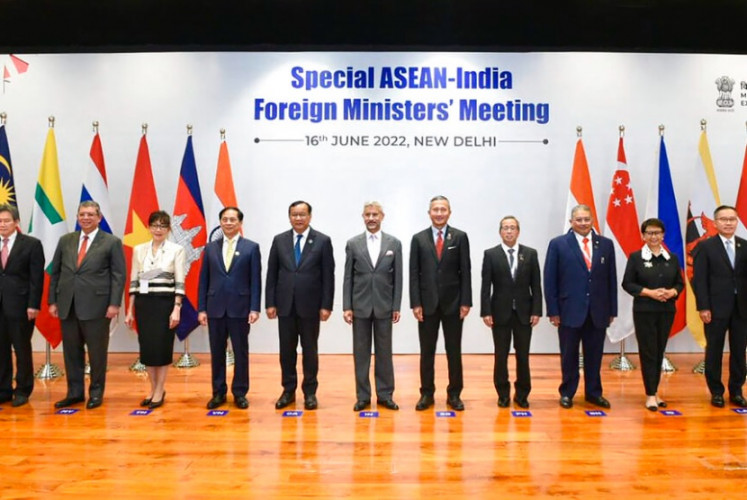EDITORIAL: Aspiring for an Islamic state
9.2 percent of respondents supported the formation of a theocratic Islamic state in Indonesia to replace the existing democratic republic.
Change Size
 A woman peeks through a window at Bambu Apus social shelter in East Jakarta on Monday, Feb. 6. The shelter currently housed Indonesians deported from Turkey for allegedly attempting to enter Syria and join Islamic State group. The government put them in custody in the shelter for deradicalization program before returning them to their hometowns. (Antara/Yulius Staria Wijaya)
A woman peeks through a window at Bambu Apus social shelter in East Jakarta on Monday, Feb. 6. The shelter currently housed Indonesians deported from Turkey for allegedly attempting to enter Syria and join Islamic State group. The government put them in custody in the shelter for deradicalization program before returning them to their hometowns. (Antara/Yulius Staria Wijaya)
N
othing is surprising about the recent survey conducted by Saiful Mujani Research and Consulting (SMRC), which found that 9.2 percent of respondents supported the formation of a theocratic Islamic state in Indonesia to replace the existing democratic republic, with nearly 80 percent rejecting the idea.
Such a composition seems to represent the reality today and perhaps the history of aspiration for an Islamic state in the country. In 1945, when the Indonesian nation state was still in the making, the majority of members of a committee designing the structure of the independent state preferred a republic in which people of various ethnicities and religions would live together, over a sharia-based state.
The choice of an Islamic state was — and is — understandable given the fact that Muslims make up the majority of Indonesia’s population. It’s no wonder that since independence such an aspiration has remained alive.
Since 1955, Islamic-based parties have contested general elections but won an insufficient percent of the vote to realize their long-standing dream of formalizing Islam through legislation, or creating an Islamic state to put it simply. Currently, only the minority Prosperous Justice Party (PKS) and United Development Party (PPP) openly claim to be the vanguards of political Islam, although they refuse to explicitly express support for an Islamic state.
Since the fall of the New Order in 1998 the PPP has twice formally proposed the implementation of sharia in the General Session of the People’s Consultative Assembly, but, as expected, to no avail.
The fact that Islamic law is enforced in Aceh is an exception based on a political compromise. The adoption of sharia in Aceh, where rebels fought for independence and where state-sponsored human-rights abuses were rampant, is the price Jakarta has to pay to maintain territorial integrity between Sabang in Aceh and Merauke in Papua.
Sharia in Aceh is the result of political negotiations that have seemingly been accepted nationwide. Anyone or any group could therefore theoretically bring the nationwide implementation of sharia, or even the establishment of an Islamic state, to the negotiation table too, through democratic channels of course.
Nobody, including the government, has the right to curtail such an aspiration or brand it a threat to the Pancasila state ideology and national security. Such a restriction would drag Indonesia back to its former period of authoritarianism, when the authorities determined what was right or wrong.
As long as the demand for a caliphate, or Islamic state, is expressed on the streets or in the legislature, as the PPP has done in vain, there is nothing to be worried about. The aspiration instead serves as a reminder that something wrong may have happened to our democracy or that our democratic system is not working well enough to realize the noble objectives promulgated in the Constitution.
Our tolerance must end only when those aspiring for a caliphate justify acts of violence or armed resistance as the rebel group Darul Islam DI/TII (House of Islam/ Military of Islam Indonesian) and the Islamic State (IS) movement have done.








